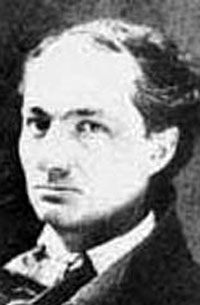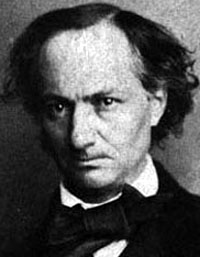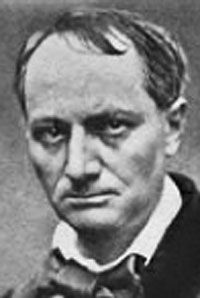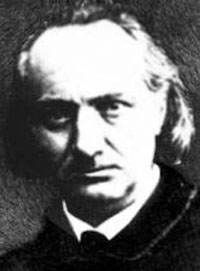Copyright Michael D. Robbins 2006
Astro-Rayological Interpretation & Charts
Quotes
Biography
Images and Physiognomic Interpretation
There are as many kinds of beauty as there are habitual ways of seeking happiness.
To say the word Romanticism is to say modern art—that is, intimacy, spirituality, color, aspiration towards the infinite, expressed by every means available to the arts.
Are you not the oasis where I dream, and the gourd from which I drink in long draughts the wine of memory?
(Moon in Cancer square Venus)Genius is no more than childhood recaptured at will, childhood equipped now with man’s physical means to express itself, and with the analytical mind that enables it to bring order into the sum of experience, involuntarily amassed.
The past is interesting not only for the beauty which the artists for whom it was the present were able to extract from it, but also as past, for its historical value. The same goes for the present. The pleasure which we derive from the representation of the present is due not only to the beauty in which it may be clothed, but also from its essential quality of being present.
These beings have no other profession than to cultivate the idea of beauty in their person, to satisfy their passions, to feel and to think.
(Venus in Aries)A frenzied passion for art is a canker that devours everything else.
(Venus conjunct Jupiter in 8th house)Dandyism does not even consist, as many thoughtless persons appear to believe, in an immoderate taste for the toilet and material elegance. These things are for the perfect dandy only symbols of the aristocratic superiority of his mind. Venus square Moon.
Multitude, solitude: equal and interchangeable terms for the active and prolific poet.
All which is beautiful and noble is the result of reason and calculation.
(Venus conjunct Saturn)The study of beauty is a duel in which the artist cries with terror before being defeated.
“Modernity” signifies the transitory, the fugitive, the contingent, the half of art of which the other half is the eternal and the immutable.
It is time to get drunk! So as not to be the martyred slaves of Time, get drunk; get drunk without stopping! On wine, on poetry, or on virtue, as you wish.
Dandyism is the last flicker of heroism in decadent ages.... Dandyism is a setting sun; like the declining star, it is magnificent, without heat and full of melancholy. But alas! the rising tide of democracy, which spreads everywhere and reduces everything to the same level, is daily carrying away these last champions of human pride, and submerging, in the waters of oblivion, the last traces of these remarkable myrmidons.
The poet enjoys the incomparable privilege of being able to be himself and others, as he wishes.
(Mercury in Pisces)Let us beware of common folk, of common sense, of sentiment, of inspiration, and of the obvious.
Evil is done without effort, naturally, it is the working of fate; good is always the product of an art.
I have cultivated my hysteria with pleasure and terror.
The dandy should aspire to be uninterruptedly sublime. He should live and sleep in front of a mirror.
Romanticism is found precisely neither in the choice of subjects nor in exact truth, but in a way of feeling.
I have always been astonished that women were allowed to enter churches. What conversation can they possibly have with God?
The artist is today and has been for many years, despite his absence of merit, simply a spoiled child. So many honors, so much money bestowed on men without souls and without education.
To handle a language skillfully is to practice a kind of evocative sorcery.
(Mercury in Pisces. Virgo Ascendant. Gemini on MC)Where one should see only what is beautiful, our public looks only for what is true.
True Civilization does not lie in gas, nor in steam, nor in turn-tables. It lies in the reduction of the traces of original sin.
Being a useful man has always seemed to me to be something truly hideous.
To glorify the cult of iimages (my great, my only, my primitive passion).
I have to confess that I had gambled on my soul and lost it with heroic insouciance and lightness of touch. The soul is so impalpable, so often useless, and sometimes such a nuisance, that I felt no more emotion on losing it than if, on a stroll, I had mislaid my visiting card.
If the poet has pursued a moral objective, he has diminished his poetic force.
Any man who does not accept the conditions of life sells his soul.
(Sun conjunct Saturn in Aries)If photography is allowed to stand in for art in some of its functions it will soon supplant or corrupt it completely thanks to the natural support it will find in the stupidity of the multitude. It must return to its real task, which is to be the servant of the sciences and the arts, but the very humble servant, like printing and shorthand which have neither created nor supplanted literature.
(Virgo Ascendant)In philosophical inquiry, the human spirit, imitating the movement of the stars, must follow a curve which brings it back to its point of departure. To conclude is to close a circle.
We have psychologized like the insane, who make their insanity greater by striving to understand it.
On poets of his generation.
You must shock the Bourgeois.
(Uranus in Capricorn conjunct Neptune)Who among us has not, in moments of ambition, dreamt of the miracle of a form of poetic prose, musical but without rhythm and rhyme, both supple and staccato enough to adapt itself to the lyrical movements of our souls, the undulating movements of our reveries, and the convulsive movements of our consciences? This obsessive ideal springs above all from frequent contact with enormous cities, from the junction of their innumerable connections.
Alas! everything is an abyss,—action, dream, desire, speech!
There are in every man, always, two simultaneous allegiances, one to God, the other to Satan. Invocation of God, or Spirituality, is a desire to climb higher; that of Satan, or animality, is delight in descent.
It is this admirable and immortal instinct for beauty which causes us to regard the earth and its spectacles as a glimpse, a correspondence of the beyond.
We are all born marked for evil.
For the perfect idler, for the passionate observer it becomes an immense source of enjoyment to establish his dwelling in the throng, in the ebb and flow, the bustle, the fleeting and the infinite. To be away from home and yet to feel at home anywhere; to see the world, to be at the very center of the world, and yet to be unseen of the world, such are some of the minor pleasures of those independent, intense and impartial spirits, who do not lend themselves easily to linguistic definitions. The observer is a prince enjoying his incognito wherever he goes.
Beauty consists of an eternal, invariable element, whose quantity is excessively difficult to determine, and of a relative, circumstantial element, which will be, if you like, by turns or all together, the era, its fashion, its morals, its passions.
Everything for me becomes allegory.
The dance can reveal everything mysterious that is hidden in music, and it has the additional merit of being human and palpable. Dancing is poetry with arms and legs.
The pleasure we derive from the representation of the present is due, not only to the beauty it can be clothed in, but also to its essential quality of being the present.
Alas, human vices, however horrible one might imagine them to be, contain the proof (were it only in their infinite expansion) of man’s longing for the infinite; but it is a longing that often takes the wrong route.... It is my belief that the reason behind all culpable excesses lies in this depravation of the sense of the infinite.
Nature ... is nothing but the inner voice of self-interest.
That in all times, mediocrity has dominated, that is indubitable; but that it reigns more than ever, that it is becoming absolutely triumphant and inhibiting, this is what is as true as it is distressing.
Even if it were proven that God didn’t exist, Religion would still be Saintly and Divine.
Drawing is a struggle between nature and the artist, in which the better the artist understands the intentions of nature, the more easily he will triumph over it. For him it is not a question of copying, but of interpreting in a simpler and more luminous language.
For the merchant, even honesty is a financial speculation.
In literature as in ethics, there is danger, as well as glory, in being subtle. Aristocracy isolates us.
The taste for pleasure attaches us to the present. The concern with our salvation leaves us hanging on the future.
There exist only three respectable beings: the priest, the warrior, the poet. To know, to kill, and to create.
An artist is an artist only because of his exquisite sense of beauty, a sense which shows him intoxicating pleasures, but which at the same time implies and contains an equally exquisite sense of all deformities and all disproportions.
It is at the same time by poetry and through poetry, by and through music, that the soul glimpses the splendors found behind the tomb; and when an exquisite poem brings tears to one’s eyes, these tears are not the sign of excessive pleasure, they are rather witness to an irritated melancholy, to a condition of nerves, to a nature exiled to imperfection and which would like to seize immediately, on this very earth, a revealed paradise.
The world only goes round by misunderstanding.
Imagination is an almost divine faculty which, without recourse to any philosophical method, immediately perceives everything: the secret and intimate connections between things, correspondences and analogies.
(Neptune square Chiron)To be just, that is to say, to justify its existence, criticism should be partial, passionate and political, that is to say, written from an exclusive point of view, but a point of view that opens up the widest horizons.
The whole visible universe is but a storehouse of iimages and signs to which the imagination will give a relative place and value; it is a sort of pasture which the imagination must digest and transform.
The man who, from the beginning of his life, has been bathed at length in the soft atmosphere of a woman, in the smell of her hands, of her bosom, of her knees, of her hair, of her supple and floating clothes, ... has contracted from this contact a tender skin and a distinct accent, a kind of androgyny without which the harshest and most masculine genius remains, as far as perfection in art is concerned, an incomplete being.
(Venus in Aries)What is exhilarating in bad taste is the aristocratic pleasure of giving offense.
There is no more steely barb than that of the Infinite.
Whether you come from heaven or hell, what does it matter, O Beauty!
The insatiable thirst for everything which lies beyond, and which life reveals, is the most living proof of our immortality.
Common sense tells us that the things of the earth exist only a little, and that true reality is only in dreams.
Love is the natural occupation of the man of leisure.
My soul travels on the smell of perfume like the souls of other men on music.
We are weighed down, every moment, by the conception and the sensation of Time. And there are but two means of escaping and forgetting this nightmare: pleasure and work. Pleasure consumes us. Work strengthens us. Let us choose.
(Sun conjunct Saturn)It is unfortunately very true that, without leisure and money, love can be no more than an orgy of the common man.... Instead of being a sudden impulse full of ardour and reverie, it becomes a distastefully utilitarian affair.
It is one of the prodigious privileges of art that the horrific, artistically expressed, becomes beauty, and that sorrow, given rhythm and cadence, fills the spirit with a calm joy.
Any newspaper, from the first line to the last, is nothing but a web of horrors.... I cannot understand how an innocent hand can touch a newspaper without convulsing in disgust.
Beauty is the sole ambition, the exclusive goal of Taste.
God is the only being who, in order to reign, doesn’t even need to exist.
What is art? Prostitution.
Nations, like families, have great men only in spite of themselves. They do everything in their power not to have any. And therefore, the great man, in order to exist, must possess a force of attack which is greater than the force of resistance developed by millions of people.
Every idea is endowed of itself with immortal life, like a human being. All created form, even that which is created by man, is immortal. For form is independent of matter: molecules do not constitute form.
The unique and supreme voluptuousness of love lies in the certainty of committing evil. And men and women know from birth that in evil is found all sensual delight.
There are moments of existence when time and space are more profound, and theawareness of existence is immensely heightened.
To be a great man and a saint for oneself, that is the only important thing.
In certain almost supernatural states of the soul, the profundity of life reveals itself entirely in the spectacle, however ordinary it may be, before one’s eyes. It becomes its symbol.
I consider it useless and tedious to represent what exists, because nothing that exists satisfies me. Nature is ugly, and I prefer the monsters of my fancy to what is positively trivial.
However incoherent a human existence may be, human unity is not bothered by it.
The vices of man, as full of horror as one might suppose them to be, contain the proof (if in nothing else but their infinitely expandable nature) of his taste for the infinite; only, it is a taste that often takes a wrong turn.
To dream magnificently is not a gift given to all men, and even for those who possess it, it runs a strong risk of being progressively diminished by the ever-growing dissipation of modern life and by the restlessness engendered by material progress. The ability to dream is a divine and mysterious ability; because it is through dreams that man communicates with the shadowy world which surrounds him. But this power needs solitude to develop freely; the more one concentrates, the more one is likely to dream fully, deeply.
Who would dare assign to art the sterile function of imitating nature?
We want ... to plunge into the depths of the abyss, Hell or Heaven, what does it matter? into the depths of the Unknown to find something new!
Even in the centuries which appear to us to be the most monstrous and foolish, the immortal appetite for beauty has always found satisfaction.
All beauties contain, like all possible phenomena, something eternal and something transitory,—something absolute and something particular. Absolute and eternal beauty does not exist, or rather it is only an abstraction skimmed from the common surface of different sorts of beauty. The particular element of each beauty comes from the emotions, and as we each have our own particular emotions, so we have our beauty.
Nearly all our originality comes from the stamp that time impresses upon our sensibility.
As a small child, I felt in my heart two contradictory feelings, the horror of life and the ecstasy of life.
All fashions are charming, or rather relatively charming, each one being a new striving, more or less well conceived, after beauty, an approximate statement of an ideal, the desire for which constantly teases the unsatisfied human mind.
But what does an eternity of damnation matter to one who has found for one second the infinity of pleasure?
I can barely conceive of a type of beauty in which there is no Melancholy.
A book is a garden, an orchard, a storehouse, a party, a company by the way, a counselor, a multitude of counselors.
A breath of wind from the wings of madness.
A sweetheart is a bottle of wine, a wife is a wine bottle.
Any healthy man can go without food for two days - but not without poetry.
Everything considered, work is less boring than amusing oneself.
In order for the artist to have a world to express he must first be situated in this world, oppressed or oppressing, resigned or rebellious, a man among men.
Inspiration comes of working every day.
It is by universal misunderstanding that all agree. For if, by ill luck, people understood each other, they would never agree.
Modernity is the transient, the fleeting, the contingent; it is one half of art, the other being the eternal and the immovable.
Nothing can be done except little by little.
Our religion is itself profoundly sad - a religion of universal anguish, and one which, because of its very catholicity, grants full liberty to the individual and asks no better than to be celebrated in each man's own language - so long as he knows anguish and is a painter.
The life of our city is rich in poetic and marvelous subjects. We are enveloped and steeped as though in an atmosphere of the marvelous; but we do not notice it.
The man who says his evening prayer is a captain posting his sentinels. He can sleep.
There are as many kinds of beauty as there are habitual ways of seeking happiness.
CHARLES-PIERRE BAUDELAIRE
1821 - 1867
Place of Birth: Paris, France
Mother: Caroline Defayis
Father: François BaudelaireCharles Baudelaire was a 19th century French poet, translator, and literary and art critic whose reputation rests primarily on Les Fleurs du mal; (1857;The Flowers of Evil) which was perhaps the most important and influential poetry collection published in Europe in the 19th century. Similarly, his Petits poèmes en prose (1868; "Little Prose Poems") was the most successful and innovative early experiment in prose poetry of the time.
Known for his highly contraversial, and often dark poetry, as well as his translation of the tales of Edgar Allan Poe, Baudelaire's life was filled with drama and strife, from financial disaster to being prosecuted for obscenity and blasphemy. Long after his death many look upon his name as representing depravity and vice: Others see him as being the poet of modern civilization, seeming to speak directly to the 20th century.
In his often intospective poetry, Baudelaire revealed himself as a seeker of God without religious beliefs, searching in every manifestation of life for its true significance, be it in the leaves of a tree or a prostitutes frown. His refusal to admit restriction in the poets choice of theme and his assertion of the poetic power of symbols makes Baudelaire appealing to modern man , as a poet and a critic.
Baudelaire was an only child of François Baudelaire and his younger second wife whom he had married in 1819, Caroline Defayis. François had begun a career as a priest, but left the holy orders in 1793 to become a prosperous middle-ranking civil servant. Being a modestly talented poet and painter, he instilled an appreciation for the arts in his son. The younger Baudelaire would later refer to as "the cult of iimages."
Baudelaire's father died in February of 1827. Baudelaire and his mother lived together on the outskirts of Paris from this point. In writing to her in 1861, referring to this time, he wrote "I was forever alive in you; you were solely and completely mine." This time together ended when Caroline married a career soldier named Jacques Aupick, who rose to the postion of General and later served as French embassador to the Ottoman Empire and Spain before becoming a senator under the Second Empire.
Baudelaire began his education at the Collège Royal in Lyons when Aupick was posted there, transfering to the prestigious Lacèe Louis-le-grand when the family returned to Paris in 1836. It was during this time that Baudelaire began to show promise as a student and a writer. He bagan to write poems, which were not well received by his masters, who felt that was was an example of precocious depravity, adopting affections that they deemed unsuited to his age. Moods of intense melancholy also developed and Baudelaire began to see himself as being solitary by nature. In April 1839 he was expelled from school due to his consistant acts of indiscipline.
Eventually Baudelaire became a nominal student of law at the École de Droit. In reality, he was actually living a "free life" in the Lattin Quarter. Here he made his first contacts in the literary world, and also contracted the veneral disease that eventually took his life.
In an attempt to draw his stepson away from the company he was keeping, Aupick sent him on a voyage to India in June of 1841. Baudelaire jumped ship in Mauritius and eventually made his way back to France in February of 1842. The voyage and his exploits after jumping ship enriched his imagination, and brought a rich mixture of exotic iimages to his work.
Baudelaire received his inheritance in April 1842 and rapidly proceeded to dissipate it on the lifestyle of a dandified man of letters, spending freely on clothes, books, paintings, expensive food and wines, and, not least, hashish and opium, which he first experimented with in his Paris apartment at the Hôtel Pimodan (now the Hôtel Lauzun) on the Île Saint-Louis between 1843 and 1845. It was shortly after returning from the South Seas that Baudelaire met the mulatto woman known as Jeanne Duval, who, first as his mistress and then, after the mid-1850s, as his financial charge, was to dominate his life for the next 20 years. Jeanne would inspire Baudelaire's most anguished and sensual love poetry, her perfume and, above all, her magnificent flowing black hair provoking such masterpieces of the exotic-erotic imagination as "La Chevelure" ("The Head of Hair").
Baudelaire's continuing extravagance exhausted half his fortune in two years, and he also fell prey to cheats and moneylenders, thus laying the foundation for an accumulation of debt that would cripple him for the rest of his life. In September 1844 his family imposed on him a legal arrangement that restricted his access to his inheritance and effectively made of him a legal minor. The modest annual allowance henceforth granted him was insufficient to clear his debts, and the resulting state of permanently straitened finances led him to still greater emotional and financial dependence on his mother and also exacerbated his growing detestation of his stepfather. The agonizing moods of isolation and despair that Baudelaire had known in adolescence, and which he called his moods of "spleen," returned and became more frequent.






